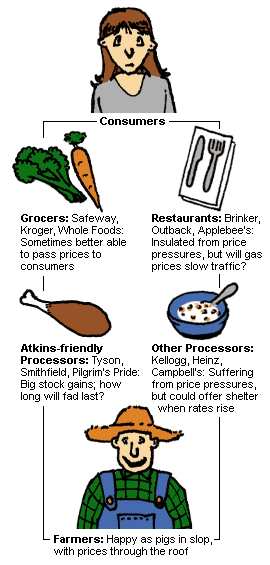NEW YORK (CNN/Money) -
Though economists often ignore food prices when talking about inflation, consumers can't, and investors shouldn't, since higher prices can be a boon for some companies and a headache for others.
Consumer prices for food and beverages have been growing at an annual rate of more than 3 percent for the past 5 months in a row, according to the Bureau of Labor Statistics, the longest stretch of such gains since 2001. In comparison, average hourly earnings have grown just 2.2 percent in the past year.
Further down the production pipeline, food prices have been absolutely skyrocketing. On Thursday, the BLS said prices for processed food and feeds jumped 8.8 percent in the past year, while farm products have jumped a whopping 22.3 percent.
But this surge in prices hasn't treated all in the food chain equally.
Farmers: happy as pigs in slop
Farmers have had the time of their lives, especially those who raise pigs, cows and other protein-rich stuff eaten by people on the Atkins diet.
"This is one of the first times I can think of when people that raise pigs are making any money, or when dairy farmers are making any money," said Amy Greene Vinson, an analyst with Avondale Partners in Nashville. "It won't go on forever, but for the time being, they're benefiting."
Atkins-friendly processors
Firms just above farmers in the food chain don't have it quite so easy. Meat processors such as Tyson (TSN: Research, Estimates), Smithfield (SFD: Research, Estimates), Pilgrim's Pride (PPC: Research, Estimates) and Hormel (HRL: Research, Estimates), for example, have to shell out big bucks to the farmers.

Still, those firms have enjoyed whopping gains so far this year, thanks in part to the Atkins frenzy. Tyson's gained 50 percent since the beginning of the year, Smithfield's up 27.1 percent, Pilgrim's Pride is up 55.5 percent and Hormel's up 16.8 percent.
Valuations for Tyson, Smithfield and Pilgrim's Pride are low compared to earnings forecasts -- though that could simply be because earnings have grown so quickly for these companies lately that most investors doubt such growth can last.
"I have 'buy' ratings on Smithfield and Hormel. I don't follow Tyson, but I could understand why people might be bullish there," said Timothy Ramey, analyst with D.A. Davidson & Co. in Denver. "There's further to go for these companies."
Vinson of Avondale Partners suggested that, when the Atkins craze ends, carbo-loaded companies like American Italian Pasta (PLB: Research, Estimates) and Interstate Bakeries (IBC: Research, Estimates), which are relatively cheap compared to analysts' earnings forecasts for the next four quarters and have taken a beating so far this year, could rise again.
Other processors
The success of most general food processors, such as Kraft (KFT: Research, Estimates), Kellogg (K: Research, Estimates), Heinz (HNZ: Research, Estimates), ConAgra (CAG: Research, Estimates) and Campbell's Soup (CPB: Research, Estimates), will depend on their ability to pass higher commodity prices on to the next level. Many have already announced price hikes, but it remains to be seen how those will go over with customers.
Meanwhile, surging oil and gasoline prices also loom over all these companies, adding to their costs of doing business.
"It's a crapshoot," said Vinson of Avondale Partners. "It's early in the game to tell which pricing sticks and which the consumer pushes back from."
Still, people always have to eat, so consumers will be less likely to dodge higher prices in some areas, which will also happen to be the kind of defensive stocks investors turn to when interest rates rise -- as they're set to do.
"Consumers will continue to spend money on some products, even if prices are rising," said Erin Ashley Smith, an analyst at Argus Research.
Grocers and restaurants
At the food chain level closest to the consumer, things are looking better. Smith suggested that, though some grocers such as Safeway (SWY: Research, Estimates) and Kroger (KR: Research, Estimates), were feeling some price pressures, they generally suffer less than processors.
"The food producers are experiencing much greater inflation, and they're not passing all of it to the grocery stores," Smith said.
And health-food grocers, such as Whole Foods (WFMI: Research, Estimates), are having an even better time, despite generally higher prices.
Vinson of Avondale Partners said restaurants such as Brinker (EAT: Research, Estimates), Outback Steakhouse (OSI: Research, Estimates) and Applebees (APPB: Research, Estimates) were also dealing well with inflation so far. Business has been booming, and food prices are a relatively low component of total restaurant costs.
Of course, higher prices at the pump could discourage customers from driving to restaurants as the summer wears on.

Analysts quoted in this piece do not own shares of the companies discussed, and their firms have no investment banking relationships with those companies.
|

